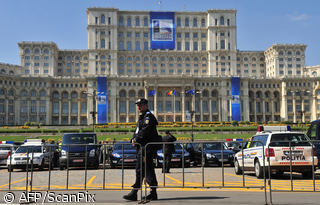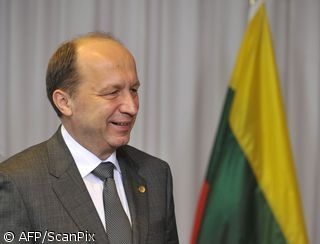Poland has received a dressing down from the European Commission
Published:
20 February 2005 y., Sunday
The EC says Poland needs to be more aggressive with its fiscal adjustment if it wants to enter the eurozone.
The response came after Poland presented an updated version of its convergence program, known as the Hausner plan, after Deputy Prime Minister Jerzy Hausner, that was markedly less ambitious than the original version. It sets out a gradual reduction of the budget deficit from 5.4 percent of GDP in 2004 to 2.2 percent by 2007. In the original plan, the budget deficit was planned to be just 1.5 percent of GDP by 2007.
These new figures are based upon real GDP growth of 4.9 percent on average in 2005 and 2006, down from 5.7 percent in 2004. In 2007 the economy is predicted to rebound with a 5.6 percent growth in GDP, something which analysts remain skeptical about.
In order to meet the criteria for entry to the EU, Poland would have to fully implement the comprehensive measures contained within the Hausner plan. This would mean a 4.7 percent impact on GDP for 2005-2007 and, although Poland has satisfied Brussels that it can correct the budget deficit in the short term, the risky strategy leaves many obstacles to getting the deficit below three percent of GDP by 2009, a key requirement for entering the single currency. EC officials also criticized the government's lack of specific steps to secure a long-term balance of public finances.
However, the Polish government remained resolute in the face of the EC critique. "Poland will enter the eurozone in 2009," Hausner asserted. "The government maintains its convergence plan. I know nothing about any change of the government stance." Addressing the EC, Hausner said: "Your anxiety is understandable, but we do what we think is proper. Stop worrying unnecessarily."
Šaltinis:
Warsaw Business Journal
Copying, publishing, announcing any information from the News.lt portal without written permission of News.lt editorial office is prohibited.
The most popular articles
 The EBRD is supporting the modernisation of transport infrastructure in Serbia with a €150 million sovereign loan to finalise the construction of a new motorway section along the strategic Corridor X.
more »
The EBRD is supporting the modernisation of transport infrastructure in Serbia with a €150 million sovereign loan to finalise the construction of a new motorway section along the strategic Corridor X.
more »
 The Executive Board of the International Monetary Fund (IMF) today completed the first review of Romania’s economic performance under a program supported by a 24-month Stand-By Arrangement (SBA).
more »
The Executive Board of the International Monetary Fund (IMF) today completed the first review of Romania’s economic performance under a program supported by a 24-month Stand-By Arrangement (SBA).
more »
 The Executive Board of the International Monetary Fund (IMF) today approved a three-year, SDR 13.57 million (about US$21.5 million) arrangement under the Poverty Reduction and Growth Facility (PRGF) for the Union of the Comoros.
more »
The Executive Board of the International Monetary Fund (IMF) today approved a three-year, SDR 13.57 million (about US$21.5 million) arrangement under the Poverty Reduction and Growth Facility (PRGF) for the Union of the Comoros.
more »
 The Executive Board of the International Monetary Fund (IMF) today completed the second review of Mongolia's economic performance under a program supported by an 18-month Stand-By Arrangement (SBA).
more »
The Executive Board of the International Monetary Fund (IMF) today completed the second review of Mongolia's economic performance under a program supported by an 18-month Stand-By Arrangement (SBA).
more »
 Parex banka has established a subsidiary, SIA NIF (“Nekustamo īpašumu fonds”, or “Real Estate Fund”), which will professionally manage assets that are not related to the Bank’s core business.
more »
Parex banka has established a subsidiary, SIA NIF (“Nekustamo īpašumu fonds”, or “Real Estate Fund”), which will professionally manage assets that are not related to the Bank’s core business.
more »
 In his address at the Lithuanian-Belarusian Business Forum “Belarus and Baltic States: new prospects for cooperation”, Prime Minister Andrius Kubilius has pointed out that Lithuania sees Belarus as creating its future in Europe...
more »
In his address at the Lithuanian-Belarusian Business Forum “Belarus and Baltic States: new prospects for cooperation”, Prime Minister Andrius Kubilius has pointed out that Lithuania sees Belarus as creating its future in Europe...
more »
 JDRF Employs VoIP and Web-Based Video Collaboration Enabled by Cisco for More Effective Teamwork Among Employees and Constituents.
more »
JDRF Employs VoIP and Web-Based Video Collaboration Enabled by Cisco for More Effective Teamwork Among Employees and Constituents.
more »
 On 16 September 2009, AB Bank SNORAS group finished the transaction during which it purchased from AB “Invalda” with its own funds 100 per cent of the shares of AB “Finasta įmonių finansai”, managing AB Bank “Finasta”.
more »
On 16 September 2009, AB Bank SNORAS group finished the transaction during which it purchased from AB “Invalda” with its own funds 100 per cent of the shares of AB “Finasta įmonių finansai”, managing AB Bank “Finasta”.
more »
 Federal Reserve Chairman Ben Bernanke that the worst U.S. recession since the Great Depression was probably over, but the recovery will take time.
more »
Federal Reserve Chairman Ben Bernanke that the worst U.S. recession since the Great Depression was probably over, but the recovery will take time.
more »
 Growth expected to return in the second half of 2009. Forecasts are still uncertain but fears of a severe, prolonged recession are fading.
more »
Growth expected to return in the second half of 2009. Forecasts are still uncertain but fears of a severe, prolonged recession are fading.
more »